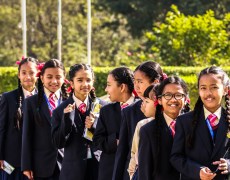
A gender-sensitive school environment report published in 2021 revealed that girls in Nepal are less likely than boys to complete secondary school, with an increased risk of dropout beginning in early adolescence mostly because of the barriers associated with emotional and mental well-being. With the onset of puberty, adolescent girls are more likely to be confused, lonely, frustrated, and in search of someone, especially their female teachers, who could support and guide them through these changes. Unfortunately, Nepali female teachers have self-reported a lack of confidence in their social-emotional competencies, making it difficult for them to respond to the social-emotional needs of adolescent girls.
Born and brought up in Nepal, I myself learned about the importance of social-emotional and mental well-being only in 2013, when I started struggling as a teacher to help my adolescent students. My female students had high expectations, but I faced multiple barriers to addressing them with gender sensitivity, including school resource allocation, biased perspectives that I myself had to face as a female teacher, and existing inequities due to caste, gender, language, ethnicity, family background, disability, and income.
As a 2022 Echidna Global Scholar, I am researching the social-emotional needs of adolescent girls in Nepal, seeking to understand the roles of their female teachers in helping address those needs.
I explored possible solutions and learned that there were recommendations that transformative social-emotional learning (SEL) can help achieve educational equity. SEL commonly refers to the process through which children and adults effectively apply knowledge, skills, and attitudes to understand and manage their emotions to empathize, connect, and achieve positive goals; transformative SEL seeks to extend this by leveraging the potential of SEL to mitigate the educational, social, and economic inequalities that derive from structural oppression. Transformative SEL seeks to build a strong, respectful foundation for adolescents to acknowledge and respect similarities and differences among each other as individuals, learn to examine and critically reflect on the roots of inequity, and foster collaborative solutions within their community and society at large. In this way, transformative SEL aims to improve the opportunities, outcomes, and achievements of all the students who are impacted by structural inequalities, with special relevance for gender-transformative education, by intentionally focusing on the emotional literacy of teachers.
Emotionally literate teachers can help students develop critical traits like autonomy, trust, intimacy, and identity at different stages in their lives by creating spaces for SEL in their everyday practice. This can support adolescents’ learning outcomes by reducing the consequences of educational inequity in both the short and long term.
Adolescent boys and girls face differences in gender norms and social expectations that lead to variations in their social-emotional needs, pointing to the need for gender-responsive practices and teachers who can serve as role models, including teachers of the same gender. However, addressing gender inequities in education has been a consistent challenge in Nepal, even when helping adolescent girls in developing their SEL skills.
Enhancing students’ and teachers’ SEL skills
Recognizing this gap in education in Nepal, in 2018 I founded My Emotions Matter (MEM), dedicated to improving emotional literacy and SEL. Through MEM, we work to ensure that education stakeholders—students, teachers, parents, and administrators—learn about SEL. This experience of working closely with education actors in the field has helped me understand that if we want to directly impact the achievements of adolescent girls, we must be intentional about enhancing the emotional literacy of their female teachers, who face systematic, gender-based discrimination and socio-cultural challenges with deep-rooted notions of patriarchy. Overcoming this will require authentic leadership and creative solutions. The recognition that advocating for evidence-driven practice and policy to address local social problems can be enhanced by collective global support prompted me to come to the Brookings Institution.
Now as Nepal continues to grapple with the effects of the COVID-19 pandemic, SEL has been put on the backburner, making the achievement of educational equity even more challenging. Moreover, female teachers themselves are feeling insecure, lonely, and vulnerable, which may make it more difficult for adolescent girls to find role models and create safe spaces to develop their own social-emotional skills. As a 2022 Echidna Global Scholar at Brookings, I am researching the social-emotional needs of adolescent girls in Nepal, seeking to understand the roles of their female teachers in helping address those needs. Through surveys, interviews, and focus group discussions, I hope to identify the supports teachers need to fulfill their role, what is currently being done, and what policies can be enhanced to ensure female educators have what they need to support transformative SEL of adolescent girls—and education equity more broadly—in Nepal.


